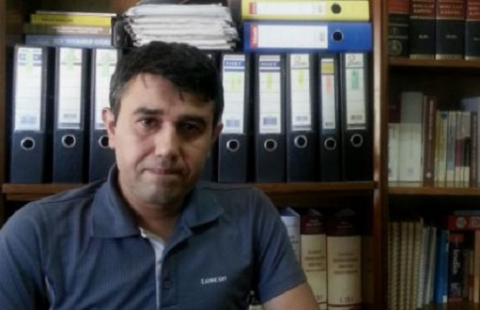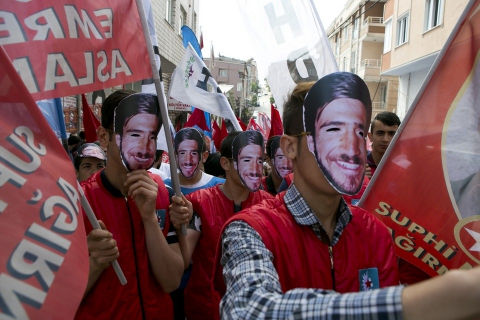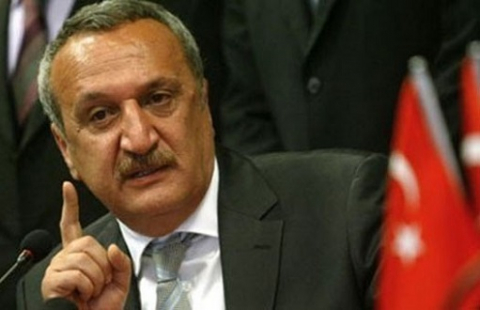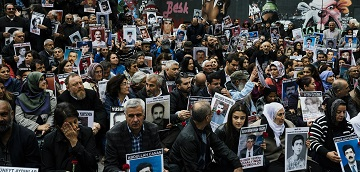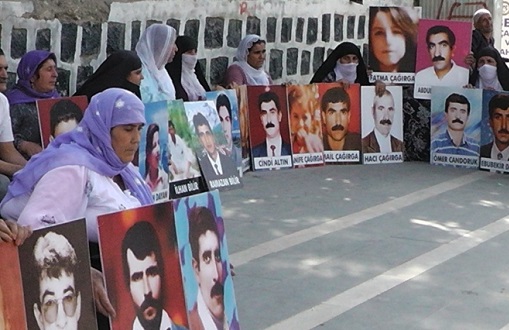
Ayhan Işık, a member of our staff who traveled to Cizre between 30 August – 6 September to document the cases of forced disappearance, wrote about his impressions on the trip.
Ayhan Işık
Cizre is located in a valley surrounded on three sides by small hills as well as Cudi and Gabar, while its flat side looks at the border. It is a place where the air is terribly hot. The Dicle River passes through the middle of the city, where approximately 100 thousand people live. The permanent military bases placed systematically on the city’s three sides have surrounded the city and absorbed it.
The city’s social life exists along the banks of the Dicle River in tea gardens and cafes that do not serve alcohol. As a result of its location on the border, intense border trade is conducted in this small crafting town. Furthermore, although livestock and agriculture used to have a larger role in the city, they still have a place within the city’s economy.
In order to make sense of the cases of enforced disappearance in Cizre, one needs to look at what happened between 1988-93. During this time, it is purported that the PKK’s political activities dictated most of the city’s life.
In 1993, after Özal’s death, the climate in Cizre changed entirely: a new era began when Demirel became President, Çiller became Prime Minister, and Güreş became Commander of the Armed Forces. Cizre was essentially selected as a test region by the local representatives of state policy, Captain Cemal Temizöz and head of the village guard Kamil Atağ, as well as PKK confessors, village guards, and a group of eight to ten people who made up a special team. Death and disappearance came to mark Cizre during this time.
One of the most significant impacts of this shift in political balance was also the spread of thousands of people closer to the PKK. We should note that in 1993, the home of Kamil Atağ, the head of the village guard, was bombed by the PKK and his father was killed.
The policy of disappearance
The ambiguity concerning the fate of the disappeared is quite overwhelming. Theirs is a state of constant torture. Almost all of the relatives we interviewed said “em hestiyê xwe dixwazin,” or in other words, “we want our bones.” In all of our interviews, we quite seriously felt that any political developments in the areas of justice, peace, or freedom would not be as comforting for the relatives as finding the bones.
Disappearance occurred in two ways. In the first method, state forces put pressure on homes, take the person into custody, and then that person is never heard from again. In the second method, however, the person disappears while outside the home. Even if families make an appeal to state institutions over and over, they are told “there’s nobody like that” and get sent away. People’s bodies are disposed of by being tossed from helicopters, being buried in desolate rural areas, being burned, and sometimes even being buried near the city center carelessly and randomly. The families believe that most of their relatives are buried underneath the home of the village guard, in the garden of the military base, or in a village in the northern reaches of Cizre under the control of Hizbullah.
It is quite difficult to discern what kinds of criterion were used by the group that committed the disappearances as they selected their target. A significant number of the disappeared were in contact with the Kurdish movement. It appears that some people disappeared for the economic gain of the village guard. It is believed that Temizöz and Atağ accumulated a significant amount of material wealth during this time.
Families’ attitudes after disappearance
We can divide families’ attitudes after disappearance into two groups. One group has tried to learn the fate of their relatives by reaching out to state institutions, the Bar Association, the Human Rights Foundation (İHD), political parties, and any other organizations that they were able to contact. The second group, however, because they do not have the money to hire a lawyer and because they want to avoid threats, are not active in any efforts to find their relatives.
Many of the families asserted that lawyers have not been interested enough, and even that some lawyers give very little or none of the reparations received at the ECHR to the families. We heard this tragic claim from many people with whom we spoke and engaged.
Families’ economic status
Most of the wives and children of the disappeared make a living by working as seasonal laborers in the Marmara, Aegean, and Central Anatolian regions of Turkey. Additionally, the municipality has initiated a very important project that provides these families’ income security: young women who come from families that lost relatives are hired by the municipality to work as municipal police. Almost all of the homes that the families live in were built by volunteer work with the support of the nearby community.
All of the families of the disappeared were politically supportive of the Kurdish movement. Especially after 1993, with the rise in state activity in Cizre and the beginning of the massacres, they saw the PKK as responsible. Several families emphasized this, saying “they went away, and that’s when these killlings and disappearances started.” It is a dominant belief that in some ways, the movement turned its back on them during this time.
While this was the case in the 1990s, how is it in the 2000s? People who want to research their disappeared relatives are tossed into prison on false pretenses… Although in those times people were threatened with death, a similar situation takes place today by throwing them into prison…
As a result of what happened, some families cannot even send their children to primary school. When we asked the reason for this, they said “why should I send them to school, they don’t have anything to give us, are they going to make us disappear as well as teach us the truth?” For example, after one young person’s 17-year-old sibling was given a sixty-year sentence, he changed his mind about taking the university entrance exam, saying “what kind of expectation can I have of this state’s system.”
Another important point is the process of burdening one person in the family with the unofficial responsibilities concerning the disappeared family member. It is a kind of division of labor. For the purposes of returning the family to normal maybe it is a division of labor that everyone accepts. Mothers typically take up this responsibility.
